#central auditory processing disorder
Explore tagged Tumblr posts
Text

Auditory Processing Disorder
[PT: Auditory Processing Disorder]
“Auditory processing disorder, also called APD, is a type of hearing loss caused by something affecting the part of the brain that processes how you hear. Ear damage causes other types of hearing loss.” - Mayo Clinic (for more press this link)
Symbol Base(link)

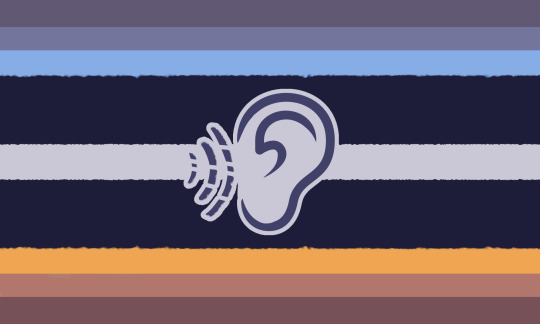

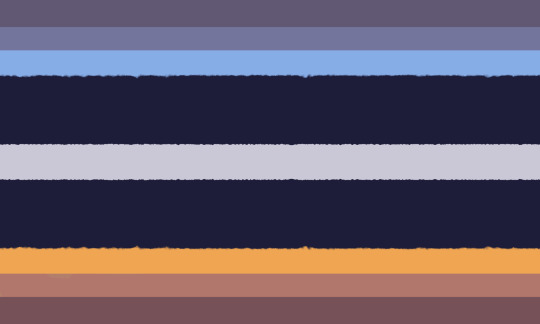
[ID: in Alt text]

[Tagging] @radiomogai , @mogai-archive, @liom-archive, @mad-pride, @mental-stuff-archive
[Commission For] @disability-kitties / @alexandraisyes
DNI is listed within my pinned post. Please go read it before interacting with any part of my content. Ask to tag.

#🎨 post#🎨 coining#🖌️ MAD#Auditory Processing Disorder#APD#Central Auditory Processing Disorder#CAPD#MAD#MAD pride#liom#mogai#liomogai#qai#liom term#mogai coining#liom coining#mogai term#qai term#qai coining
70 notes
·
View notes
Text
my autistic ass contemplating the need for a fridge with this damn hum burning a permanent hole in my brain.

i just wanna do schoolwork in peace. i just wanna read and write and do a god damn thing without it's constant fuckery and not needing music or headphones because those get bothersome after a while and add to the sensory overwhelm.
in conclusion: revisiting the living in the middle of nowhere fantasy daily again, that way at least i can run outside to silence/nature noises if im bothered, unlike now where it's just... cars. how bout you?
#autistic#autism#autism meme#meme#lol#neurodivergent#neurodivergent meme#Central Auditory Processing Disorder
14 notes
·
View notes
Text
Auditory Processing Disorder/Jumbled Noise
Risks If your cat has APD, they can get two types of headaches, lose auditory information, and be unable to access words as well as get an earache.
Comorbid What's frequently comorbid with APD is Autism, ADHD, light sensitivity and sensory processing disorder.
WIP status Jumbled Noise has a lot of conditions that need polishing or lumping it together. Earaches and the two kinds of headaches could be lumped into overstimulation, but at the same time, having the spectrum from mild headaches that you can more or less ignore to headaches that disable you from living life is very affirming to people like me who have APD. Word loss versus verbal shutdown is also something that could be lumped together but may be better apart. After all, being able to speak but unable to get the exact words you want is not the same as being unable to speak temporarily, but from an outside perspective, it may be confusing on why they are separated. Jumbled Noise still needs a lot of polish but without more community feedback, it is at a stalling point.
History Fun fact! APD and HSD were the first two conditions Mod Song ever coded completely by hirself! APD is something that they never really saw representation for so when shi got the opportunity to add it, they lept at it.
What's next? What is next is making more thoughts and waiting until we get community feedback about APD.

[ID Begins: A screenshot of a grey kit with Jumbled Noise. End ID]
#mod song#condition deep dive#dadm clangen#disabilities and disorders mod#clangen#auditory processing disorder#central auditory processing disorder
10 notes
·
View notes
Text
If you tease anyone ANYONE'S way of speaking for ANY REASON
You get to go in the shame hole.
67 notes
·
View notes
Text

Auditory Processing Disorder, also known as Central Auditory Processing Disorder is a learning disability where there is a deficit in a person's ability to internally process and/or comprehend sounds. I am on the more severe side of the auditory processing disorder spectrum. The main reason why I have a learning disability is because if I didn’t have auditory processing disorder, then I would not have Dyslexia and ADD. I was technically diagnosed with Central Auditory Processing Disorder, then Auditory Processing Disorder, still the same thing, nonetheless. When I was in school, there were times I struggled to do my work or read because the kids in my class would not shut up and do their own work. The students would not do their reading or literally anything else in silence. I have a hard time focusing and doing my work; I feel like most people don't mind the sound of people talking or music playing in the background while doing work. They can easily tune out sounds and still get their work or reading done. Also, if there is too much noise or too many things going on while someone is talking to me, I can easily miss what they are saying or mishear them. I will think I know what they said, but I will be wrong. They have really said something completely different, but I miss it because of my Auditory Processing Disorder.
Therefore, my inspiration with the blurry background of people talking and music playing, while the teacher is talking is from my Auditory Processing Disorder. Also, the blurry text shows what the teacher is saying while blending in the background because to me it’s just all in the same sounds. Also, the processing eyes are to show the processing part of the Auditory Processing Disorder. That is my inspiration for the Auditory Processing Disorder art piece.
#art#artwork#my artwok#central auditory processing disorder#auditory processing disorder#awareness#learning disability#neurodiversity#neurodivergent#digital art#digital aritst#digital arwork#digital painting#digital drawing
6 notes
·
View notes
Text
I need to get on the sides of tumblr that have posts about my specific neurodivergenceys this is far too correct
Dealing with auditory processing disorder
LAWFUL: take the parts you heard and turn it into a clarifying question, e. g. "you saw your cousin where?" or "she's writing a what?"
NEUTRAL: "what did you say?"
CHAOTIC: take a wild stab at what the person said, e. g. "you want to baptize a mackerel?"
#auditory processing disorder#central auditory processing disorder#why the hell is that so long but its not well known so I cant shorten it to APD or CAPD help#its the neurodivergency
69K notes
·
View notes
Text
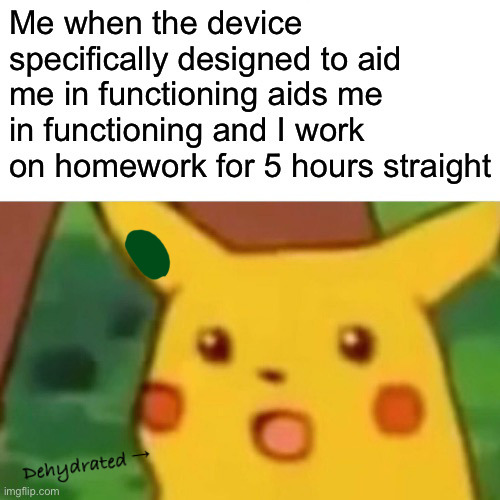
#so anyways I got an ear filter for my recent capd diagnosis and then the first day I was in the zone for 5 hours straight.#still to early to tell if it was really the filter but I mean. I mean. I thought I was gonna crap out 4 hours ago.#actuallyautistic#actually autistic#actually adhd#actually capd#(central) auditory processing disorder#fun fact it’s an academic argument about whether it should be called capd or apd but it’s all the same thing#your neurons transfer the signals from your ears up to your brain at slightly different speeds#and so the audio signals you get are slightly desynced#what the filter does is physically slow down the sound as it travels thru one ear#thus resyncing the audio and reducing your subconscious load#fascinating stuff.
8 notes
·
View notes
Text
about grace echolalialand
20yo, moderate support needs autistic lesbian with a complex gender identity. trans-identified and experienced.
physically disabled with ehlers-danlos syndrome and comorbid health issues. part-time mobility aid user, mostly a cane and a rollator.
hard of hearing with central (neurological) hearing impairment. yes, this makes me "actually" hard of hearing. don't send asks asking if you have it. see a doctor.
listing diagnoses is weird! anyways my primary mental diagnoses are c-ptsd, autism, and severe treatment-resistant depression. secondary adhd and ocd. misdiagnosed with bpd at 18 and working to get off meds. i am mentally ill and i may act that way.
my support needs are not met but we are working on it!
my language abilities are all across the board. i speak in really complicated words and language sometimes so i am sorry. but i struggle to simplify so you can definitely ask me to simplify but i might struggle! i also sometimes struggle to use grammar and good words at all. i am both hyperverbal and hyperlexic.
i am a college student and my special interest is healthcare. other interests are: reading, writing, marijuana, queer theory, the color pink, fashion
stances/byf:

pro informed self dx and non-diagnostic "professional recognition" including of msn/hsn autism when appropriate (idk some people are abused and care is withheld or things are misdiagnosed and the healthcare system is notoriously racist and sexist and i'm not abt to tell someone what their story or diagnosis is because it's not my business. i don't understand why it's necessary to know other people's diagnosis status and i never have understood that).
i do not reclaim the r slur and will not participate in discourse about reclaiming it. but i might giggle if you reclaim it appropriately. the topic of it may come up still, but i will not say it outright.
i will not tolerate my diagnosis or support needs being questioned because i'm solid in that. i won't even let healthcare professionals do that at this point. i will make fun of you, take screenshots, and share with my family and friends what an idiot said about me online. so... leave.
i will use support needs labels VERY regularly on anyone tbh (low, moderate, high). i will only use levels (1, 2, 3) on people who have identified them as such. functioning labels (low, high) are not used here but i am not necessarily totally against their use.
i center autistics who are and speak as an autistic who is: visibly autistic, visibly disabled, moderate support needs, under-supported. and to a somewhat lesser extent i speak on being: hyperverbal/hyperlexic autistic, extroverted autistic, adults living at home, adults with higher support needs, high-masking moderate support needs
i love to talk so send me asks about absolutely anything! i will struggle to respond to dms, so if it's a non-personal question, an ask is the best way to go! :3
send asks about: autism, disability, the informed self diagnosis process, healthcare, the mental healthcare system, queer stuff and theory, coming out and living as queer, transitioning and detransitioning, my real life, college and what i'm studying, and anything!!!
don't come to question whether neurological hearing impairments and auditory processing disorders "count" as hard of hearing and "belongs" in the deaf community. my specific audiologist referred to my specific case as hard of hearing and as having hearing loss. i function and interact in my day-to-day life as hard of hearing. that's all you need to know. i understand my experience is fundamentally different than those with non-neuro hearing loss, and that's plenty.
i will not respond to or reblog fundraisers, donation requests, anything political that isn't disability-centric, and absolutely no guilt-tripping. i am obsessive-compulsive. it is bad for me. if you reblog or post guilt trip posts i will not follow and will probably block.
participating in politics is extremely difficult and stressful for me and the anxiety it brings me isn't worth the minimal benefit i can provide. i don't understand a lot of what's going on or why it's happening and if it's unrelated to my special interests, i empathize and i'll vote for what i believe is right, but i don't care to talk about it.
i am HIGHLY MASKED on other social medias and grace is my real name. i post my face sometimes because i don't care. yes, i can talk acceptably, and pose, and participate in some discourse (all with soo many versions and takes and mistakes).
thank you for reading!
12 notes
·
View notes
Text
Dark Grey Matter: Neurodivergence and the Goth Experience
[originally posted here]
Alternative subcultures have existed for nearly as long as human society. Modern examples include the flappers of the 1920s, the beatniks of the 1950s, and the hippies of the 1960s. These alternative subcultures have been defined by music, literature, fashion, and film. For those outside of these subcultures, it may be unclear what would make one wish to exist in a group that is not part of the norm. While there are many factors for each individual, it is clear that neurodivergence plays at least part of a role for many people. For the case study, I will be using the goth scene, being a member myself and because it is both newer and longer lasting than some of the others, being what to subcultures as water is to liquids, if you may. There have already been analyses of specific post-punk musicians and their neurodivergent diagnoses - Gary Numan and David Byrne being autistic, Danny Elfman with his ADHD/OCD combo, and Blixa Bargeld being synesthesic, not to mention speculation about countless others. This is not one of those. The musicians are important, but this is more about the members of the subculture as a whole, whether they produce music or not. This is also not to say that every goth or person in any given alternative subculture is neurodivergent or that every neurodivergent person is involved in an alternative subculture, just an observation on the overlap between the two.
To start us off, let us focus on what is typically seen as central to the goth subculture: the music. There are currently a myriad of subgenres of goth music: darkwave, deathrock, gothic rock, and ethereal wave, among others. It is sometimes difficult to define goth music as a whole, especially with bands that bleed into non-goth specific post-punk genres, such as shoegaze or industrial and with different terminology being more popular in different regions and eras. A rough definition for all of these subgenres would be a variety of alternative rock music with origins in punk (though some have influence that includes glam rock, synthpop, and even Caribbean-British dub reggae) that typically values minor chords, a heavy bassline that dictates the melody, slower rhythms, mezzo vocals, and artful, often dark lyrics. Why would this genre appeal to neurodivergent people specifically? The initial appeal is the sound. A common comorbidity with autism, ADHD, and other variations of neurodivergence is Auditory Processing Disorder or other differences in sound processing. Those thusly impacted may respond to verbal cues more slowly, be irritated by certain sounds more easily than others, and mishear words more frequently. There are numerous hypotheses to address differences in musical taste and likely multiple contributing factors and differences in audio processing may be one of those factors. While not every instance of APD is exactly the same, it is easy to see how a music genre that focuses on deeper pitches, more pronounced vocal styles, and slower rhythms would aurally appeal to individuals who experience auditory processing differences.
Aside from the way that the music sounds, there is also great appeal in the lyrical content. Certainly, goth bands touch on a variety of topics, from the historical monologues on the World Wars by Joy Division and the Pagan rites of Inkubus Sukkubus to the scathing diatribes of 1980s conservative politics by Sisters of Mercy and the sexual escapades explored by London After Midnight, just to name a few. Across the diverse set of subjects that these bands cover, there is a consistent return to one recurring theme: being an outsider observing an imperfect world. The experience of feeling like an outsider is certainly one that many neurodivergent individuals can relate to. Many neurodivergent individuals are made to feel like outsiders from a young age, often bullied by their peers for their communication styles and told by family members to behave differently, traits they have difficulty controlling. With differences in communication and internalizing the world, it is difficult to make sense of supposed social rules and forge connections. When one has similar requirements to exist happily as others but difficulty obtaining them due to reasons outside of one’s control, it is easy to recognize the world as a flawed place full of inequality and rewards for shallow traits. There is hope for those whose auditory processing differences do not manifest in alternative music, at least not exclusively. Fortunately for youth of today who still feel like outsiders, be it due to neurodivergence or anything else, but still have more mainstream aural preferences, modern pop artists are less afraid of embracing oddity and touching on feelings of isolation. Some may even serve as bridges for those with a taste for multiple genres as some pop artists have expressed an appreciation for goth artists. One now-former member of One Direction previously cited Joy Division’s Unknown Pleasures as a primary music inspiration, Dua Lipa did a photoshoot that made an homage to Siouxsie Sioux, and Billie Eilish has been seen performing in an Alien Sex Fiend shirt.
Of tertiary importance to the scene compared to music but more obvious to those not involved in the scene is fashion and makeup. The way that neurodivergent people often do not internalize social norms, current trends are often similarly not internalized, so dressing according to any sort of trend is not even considered. That being said, clothes are not necessarily chosen at random either. Something of utmost importance to many neurodivergent individuals when choosing clothes, as with many of their neurotypical counterparts, is comfort. This sometimes manifests in more obvious physical ways, such as removing tags or avoiding certain fabrics. It is easy to see how a scene that values DIY aesthetics would appeal to those with sensory differences; no one can fault one for cutting off a tag when the entire outfit is cut up and put back together with safety pins. However, there are also ways to achieve psychological comfort. Case in point, Blixa Bargeld, founding member of German industrial band Einstürzende Neubauten and arguably founder of the industrial music genre as well as former guitarist of Nick Cave and the Bad Seeds, has attributed his preference for wearing all black to to his synesthesia and finding other colors to be too overwhelming. Many black-wearers have made similar statements, with or without a diagnosis of synesthesia or something similar. Neurodivergent people also often find comfort in wearing clothing related to one’s special interest, so band shirts are a common staple, along with outfits that homage musicians, movie characters, or others they admire. There is also the issue of expression. Neurotypical people often have difficulty reading the emotions of their neurodivergent peers due to differences in emotional expression. Clothing and makeup, in addition to highlighting one’s general interests, can also help in making emotional expression more obvious to others. Of later importance, many neurodivergent individuals find that dressing in a way that labels them as a person with certain interests, this can help them attract others of similar interests. Given that many neurodivergent people have difficulty making friends and initiating social interactions, having an easy way to call to others that they are like them is socially beneficial.
In conclusion, it is clear why there is a connection between these two. Alternative subcultures are a welcoming environment for many who feel like outsiders are neurodivergent individuals are often made into outsiders by default. In addition, the sounds and sights of goth specifically appeal to many of those with specific sensory differences. With such a long, rich history that continues to this day, this subculture is fit to be quite a rewarding special interest.
41 notes
·
View notes
Text
How Does The Brain Work?
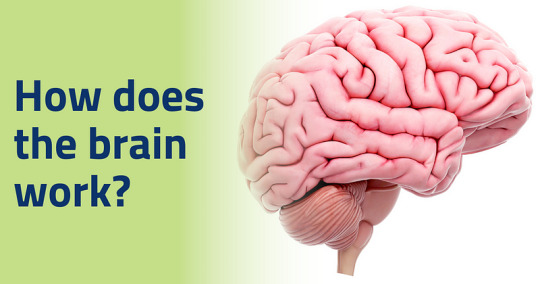
The brain stands as a marvel of biological engineering, Composing of a multitude of bodily functions ranging from cognition and memory to emotions and sensory perception. Together with the spinal cord, it constitutes the central nervous system (CNS), the command center of the human body.
Composition of the Brain
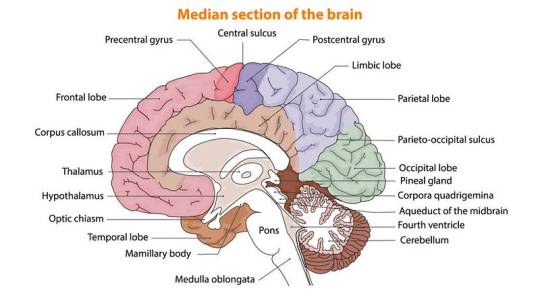
Weighing approximately 3 pounds in adults, the brain’s main structure comprises about 60% fat, interspersed with water, protein, carbohydrates, and salts. Unlike muscles, it houses a complex network of blood vessels and nerves, including neurons and glial cells.
a) Gray and White Matter
Within the central nervous system, gray matter and white matter occupies distinct regions. In the brain, gray matter forms the outer layer, rich in neuron somas, while white matter constitutes the inner section, primarily composed of axons unsheathed in myelin. Conversely, in the spinal cord, this arrangement is reversed.
b) Brain Functionality
The brain operates by transmitting and receiving chemical and electrical signals throughout the body. These signals regulate a myriad of processes, with the brain disseminating each input. Some signals remain confined within the brain, while others traverse the spinal cord and nerves, disseminating information across the body’s expanse. This composes neural network relies on billions of interconnected neurons.
Major Brain Regions and Their Functions
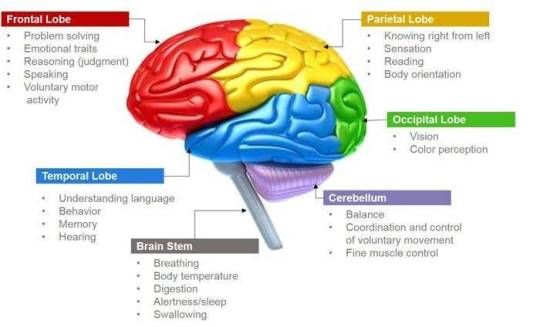
1.Cerebrum
Dominating the brain’s landscape, the cerebrum encompasses the cerebral cortex and underlying white matter. It governs a spectrum of functions, including motor coordination, temperature regulation, language processing, emotional regulation, and sensory perception.
2. Brainstem
Serving as the bridge between the cerebrum and spinal cord, the brainstem comprises the midbrain, pons, and medulla. It regulates vital autonomic functions such as heart rate, breathing, and reflexive responses.
3. Cerebellum
Nestled at the posterior aspect of the brain, the cerebellum coordinates voluntary muscle movements, posture, balance, and motor learning.
Brain Coverings
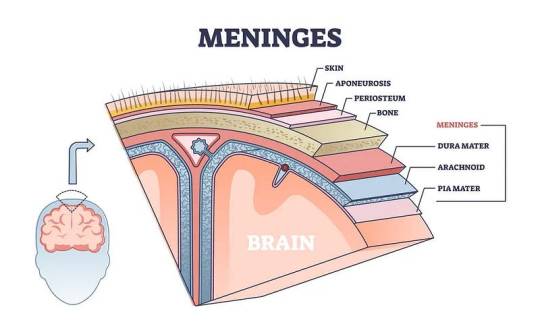
a) Meninges
Three layers of protective membranes, collectively known as meninges, enshroud the brain and spinal cord. These layers — dura mater, arachnoid mater, and pia mater — shield the delicate neural tissue from physical trauma and infection.
b) Lobes of the Brain
Each hemisphere of the brain comprises four lobes, each harboring distinct functional domains:
Frontal Lobe: Governing executive functions, motor control, and higher cognitive processes.
Parietal Lobe: Integrating sensory information, spatial awareness, and perception of pain and touch.
Occipital Lobe: Specialized for visual processing and perception.
Temporal Lobe: Involved in auditory processing, language comprehension, and memory consolidation.
Deeper Brain Structures
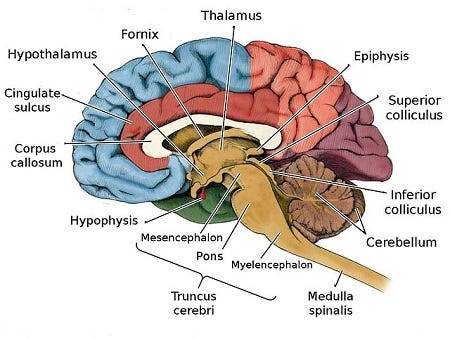
These encompass important structures such as the pituitary gland, hypothalamus, amygdala, hippocampus, and pineal gland, orchestrating hormone secretion, emotional regulation, memory consolidation, and circadian rhythms.
Blood Supply
The brain receives its oxygenated blood supply through the vertebral and carotid arteries, ensuring adequate perfusion of neural tissue. The main network of blood vessels, including the Circle of Willis, safeguards against ischemic insults and facilitates intraarterial communication.
Cranial Nerves
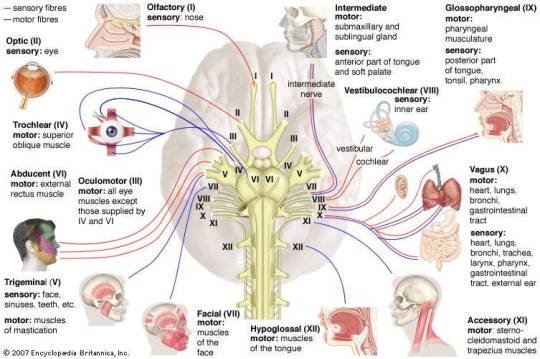
The twelve pairs of cranial nerves, originating from the brainstem, mediate a diverse array of sensory and motor functions, encompassing olfaction, vision, facial expression, and auditory perception.
Comprehending the anatomy and functionality of the brain fosters a deeper appreciation of its complexity and facilitates advances in neuroscientific research and therapeutic interventions aimed at diminishing neurological disorders.
Understanding the detailed anatomy and functionality of the brain is crucial for medical students embarking on their journey of study. Expert Academic Assignment Help offers invaluable assistance in navigating the complexities of neuroscience and related subjects. By leveraging expert guidance and support, students can excel in their medical education and contribute to advancements in the field of Medicine. Email us at [email protected] to embark on your path to scholarly excellence and professional competency.
#studying#studyblr#study blog#study aesthetic#student life#student#medical student#medical school#medicine#university student#university#university life#assignment help#medical students#nursing student#nursing school#healthcare#health and wellness#mental health#psychology#phd life#phd thesis writing service#online writing#do my online class#academic writing#essay writing#academic assignments#academia
17 notes
·
View notes
Note
hello summer!
i have been to a doctor about possibly having autism once now with my mum.
she suggested that i have ADHD + CAPD rather than autism, or my symptoms were caused by a deficiency in Vitamin B12. she said that it was very unlikely i had autism, just because she thinks that throughout all my life we would've caught it by now.
it's possible it's just a deficiency in Vitamin B12, because you mostly get the vitamin from meats. i am mostly vegetarian and don't eat a lot of meat.
if the deficiency in Vitamin B12 is the case, then all my symptoms should go away if i start taking Vitamin gummies or something to get the required vitamins.
It would be great if all these problems went away as easy as that, but then it doesn't entirely explain some other things?
like, for example, autistic people can have poor proprioception, which i feel i relate to. i have gonr at most an entire 14 hours without eating because i simply couldn't sense i needed to eat. it's an ongoing problem for me that i can't sense that i need to eat/drink, and it isn't exactly new. it's been going on for a while and for 2-3 months i thought i must have some kind of eating disorder, but of course, no eating disorder i researched described what i was experiencing. but then, i discovered that it can be an autism thing.
for the past maybe 4.5 months i've been researching what exactly autism is and how it appears. i've looked back on experiences in my life and thought that it made sense i could have autism.
i feel like it can't really be just a deficiency, but i have no idea how to say that. i'm not great at communicating why i think something, so i don't want to say it to my mum, because if i do she'll ask why and the answer is complicated and long, and i always seem to stutter and trip over my own words. i just really struggle to explain complicated things, and the more i fail to explain, the harder it gets because i start to panic that it's not working.
and then, if it is just a deficiency and my sensory issues go away as fast as they just suddenly appeared (noise sensitivity just kind of appeared in january.), then what about my other experiences? if it's just a deficiency and not anything more, then is there just something wrong with me? it's really frustrating to me, because i have no idea what it is.
i've taken spectrum tests online, most of which said i had moderate to high symptoms of ASD, and i've seen that people afab often end up learning early how to mask and don't get diagnosed (i'm afab).
having ADHD + CAPD could explain some stuff for me too. i was told that my concern isn't being pushed aside for what the doctor thinks, but it feels a little like it is.
she gave us some tests and there was one for my teacher. i gave it to her a week ago, and she hasn't handed it back. i'm hoping she can give it back soon because there's only a few days left before summer begins and my school year ends.
i guess i'm just worried in general about this, + some other stuff going on in my life right now. thank you for reading through this, i appreciate that. it was just kind of a rant. 💞
Hi there,
I did some research on ADHD and Central Auditory Processing Disorder (CAPD). I found one article that goes into detail about both of these. Here are some excerpts:
People with ADHD may have trouble processing sensory input, including auditory information. For example, a 2017 studyTrusted Source notes that children with ADHD do not perform as well on auditory processing tests. However, they perform similarly to neurotypical children after treatment with methylphenidate. This suggests that auditory processing issues may be an ADHD symptom.
ADHD affects executive functioning, attention, and impulse controlTrusted Source. This may make it more difficult for people to process sensory input, including sounds. It may be difficult or impossible for a person with ADHD to interpret sounds or distinguish one sound from another, particularly in distracting environments.
Research also suggests that people with ADHD may have other sensory processing issues. They might crave sensory stimulation through chewing or be less responsive than typical to sensory input, such as loud noises or bright lights.
Similarly, symptoms of APD may mimic those of ADHD. This is because a person who cannot correctly interpret sound may appear to be inattentive. Their sensory difficulties can also affect behavior. A 2018 systematic review emphasizes that children with APD have similar characteristics, including behaviors and test scores, to children with ADHD.
It is also possible for a person to have both ADHD and APD.
The article will be below if you want to read it.
If Vitamin B12 is the issue, I would try to take some vitamins and see if your symptoms improve. If not, then I would talk to your doctor.
I should also mention that the signs and characteristics of both ADHD and Autism have quite the overlap. Here’s a helpful Venn diagram to show the similarities and differences.
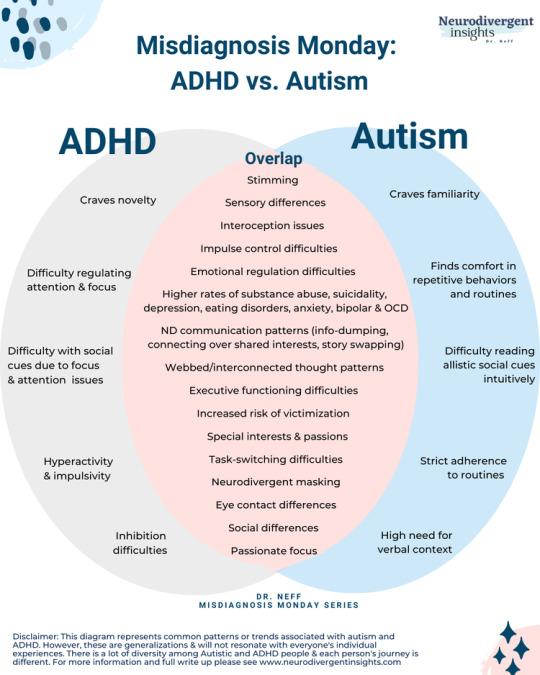
There’s also another Infograph talking about the statistics of ADHD and Autism:
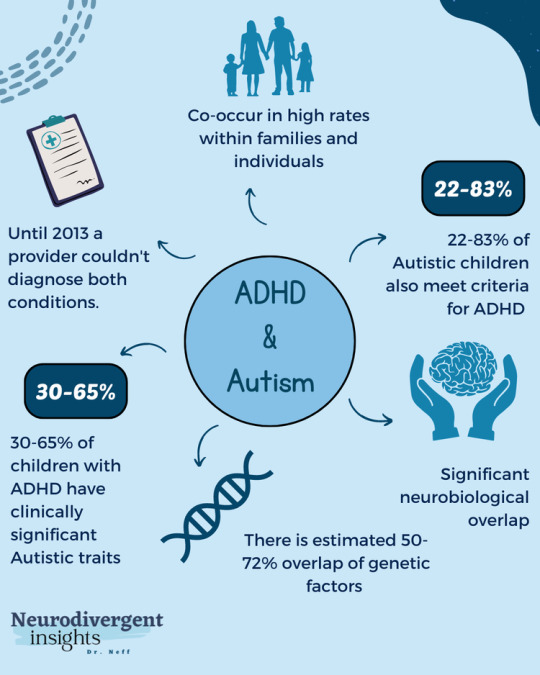
I’ll also leave the article below so you can check it out.
I really hope you find this information helpful. I wish you luck and I hope you figure out what’s going on.
Thank you for the inbox. I hope you have a wonderful day/night. ❤️
38 notes
·
View notes
Text
Bruh, I swear, I always hear Will Wood singing "gravy" at the end of "Your Body, My Temple". Even though I know what he says and try to force my brain to hear it, it's very difficult for me to understand him saying "baby".
How bad is my hearing?
No kidding, I have a strong suspicion that I have Central Auditory Processing Disorder.
3 notes
·
View notes
Text
How should I deck out my noise cancelling headphones? I'm taking suggestions!
#Shortcake/Muffin - Chocolate/Batter#nueropunk#apd#central auditory processing disorder#auditory processing disorder#noise cancelling headphones
8 notes
·
View notes
Link
Central Auditory Processing (CAP) Information Tammy Riegner, Au.D., Jessica Godovin, Au.D. PA-Newtown Square/Philadelphia: Jessica Loson, Au.D. NJ-Voorhees/Deptford: Jenna Pellicori, Au.D. According to the American Speech and Hearing Association, central auditory processing disorder (CAPD), is a complex problem affecting approximately 5% of school-age children. These children may not be able to process the information they hear in the same way as others because something adversely affects the way the brain recognizes and interprets sounds, most notably the sounds composing speech. The behaviors of other disorders, such as a learning disability, language delays, and attention deficit disorder can mimic the signs and symptoms of a CAPD; consequently, it is recommended that these disorders be ruled out prior to conducting a Central Auditory Processing evaluation. Multidisciplinary testing is very important in determining not only evaluation candidacy but potential contributing diagnoses. Risk factors associated with auditory processing disorder, may include but are not limited to: • Asphyxia/Anoxia • Severe Prematurity • Reoccurring Ear Infections • Traumatic Brain Injury • Family history of CAPD • Lead Exposure Further evaluation may be warranted if the following auditory behaviors and characteristics apply: • Difficulty recalling short or long term information • Mishears information (i.e.: “nose” for “toes”) • Says “huh” or “what” frequently • Difficulty following verbal multi-step instruction • Confuses similar words or sounds • Unusually bothered by loud or sudden noises • Requires repetition of auditory information • Struggles with phonics, spelling, or writing • Difficulty in the presence of background noise • Does opposite of what is requested Candidates for CAPD testing must meet the following criteria: • Developmental and chronological age of at least 7 years • Normal peripheral hearing sensitivity (No significant hearing loss) Contraindications to testing include: cognitive deficits, non-verbal or non-native English speaking, global developmental delays, below average scoring on IQ testing, severe or unmanaged Attention Deficit Hyperactivity Disorder (ADHD), low functioning Autism Spectrum Disorder (ASD), Auditory Neuropathy Spectrum Disorder (ANSD), or significant receptive and/or expressive language disorders. Courtesy of Neumors Pediatric Hospital (Wilmington, DE). [Read More]
0 notes
Text
Siemens Hearing Aid Prices in India and Best Audiology Clinic for Children in Delhi
In the hustle and bustle of India’s capital, ensuring proper hearing health is more than a necessity—it’s a commitment to a better quality of life. If you or your loved ones are experiencing hearing issues, finding the popular audiology clinic in Delhi becomes a top priority. With an increasing number of people seeking expert help for hearing loss, speech therapy, and audiological assessments, the demand for reliable audiologists has surged in recent years.
Whether it’s the elderly facing age-related hearing decline or children needing early intervention for speech and hearing development, the role of a qualified audiologist cannot be underestimated. Fortunately, Delhi offers access to some of the most advanced and well-equipped hearing clinics. Especially if you're looking for an audiology clinic near New Delhi, the options are both plentiful and highly specialized.
Why Delhi Is a Hub for Hearing Healthcare
Delhi has established itself as a center for advanced medical care, including hearing and speech services. Many clinics are outfitted with state-of-the-art technology, ensuring accurate diagnostics and personalized treatment plans. When you’re searching for a top rated audiologist in Delhi, you’ll find that the city is home to numerous certified professionals with extensive experience in both pediatric and adult audiology.
In addition to their technical qualifications, many audiologists in Delhi work closely with ENT specialists, neurologists, and speech therapists to offer comprehensive care. Whether it’s sensorineural hearing loss, conductive hearing loss, or central auditory processing disorders, clinics here are equipped to manage all types of hearing issues efficiently.
Features That Make a Clinic the Popular Audiology Clinic in Delhi
What exactly defines the popular audiology clinic in Delhi? It’s not just about equipment or location. The most sought-after clinics stand out due to their patient-centric approach, transparent diagnosis, multidisciplinary collaboration, and a strong track record of success stories.
Here are a few elements that patients often look for:
Certified and experienced audiologists
Advanced diagnostic tools such as pure-tone audiometry, tympanometry, and otoacoustic emissions testing
Customized hearing aid fitting and programming
Post-fitting rehabilitation programs
Dedicated services for children with hearing impairments
When these factors come together, they create a facility that patients not only trust but also recommend to others, making it the go-to audiology clinic near New Delhi.
Finding the Top Rated Audiologist in Delhi
The journey toward better hearing begins with the right professional. A top rated audiologist in Delhi often brings more than just technical skills to the table. They possess a deep understanding of patient needs and deliver services with empathy and precision.
Whether you're facing age-related hearing issues or occupational hearing damage, a top rated audiologist in Delhi will first carry out a comprehensive hearing evaluation. Based on the diagnosis, they will recommend appropriate solutions such as digital hearing aids, assistive listening devices, or therapy options.
You can also find audiologists who specialize in tinnitus management, auditory verbal therapy (AVT), and balance disorders, further enhancing their reputation in the capital city.
Why Choose the Best Audiology for Children in Delhi
Children require a unique, gentle, and highly skilled approach when it comes to audiology. A minor hearing issue at a young age can impact speech development, academic performance, and social behavior. This is why parents actively search for the best audiology for children in Delhi.
Clinics that specialize in pediatric audiology offer a range of child-focused services:
Newborn hearing screening
Behavioral audiometry for toddlers
Speech and language therapy
Cochlear implant mapping
Parental counseling and education
The best audiology for children in Delhi is usually affiliated with child development centers, special education institutes, or pediatric hospitals. These clinics adopt a holistic approach that goes beyond hearing and speech—it includes emotional and developmental support for both the child and the parents.
Accessibility Matters: Finding an Audiology Clinic Near New Delhi
If you reside in or around the capital's central area, looking for an audiology clinic near New Delhi can help you avoid the hassles of long commutes while ensuring timely treatment. Several reputed clinics have branches across South Delhi, East Delhi, and even parts of NCR like Noida and Gurugram.
These conveniently located centers are well-equipped to handle walk-ins, scheduled appointments, and emergency audiology services. Many clinics near New Delhi are also affiliated with diagnostic labs and pharmacies, offering a one-stop solution for your hearing health.
The Digital Advantage: Online Consultations and Remote Audiology Services
In the post-pandemic era, many audiology clinics in Delhi have adapted to digital platforms. Whether you are looking for hearing aid tuning, speech therapy follow-ups, or even second opinions, several popular audiology clinics in Delhi offer online consultations. This is particularly helpful for elderly patients or parents managing busy schedules.
Additionally, mobile apps and cloud-based hearing aid software have made it easier to adjust hearing settings without having to visit the clinic physically. This blend of technology and healthcare ensures that Delhi remains a frontrunner in modern audiological care.
Final Thoughts
Choosing the right audiology clinic is a decision that affects your or your child’s quality of life. If you’re searching for the popular audiology clinic in Delhi, make sure to evaluate the credentials, experience, and reviews of the clinic. Proximity is also key—opting for an audiology clinic near New Delhi can make regular visits more manageable.
#siemens hearing aid prices in india#popular audiology clinic in delhi#best audiology for children in delhi#hearing aids available online
0 notes
Text
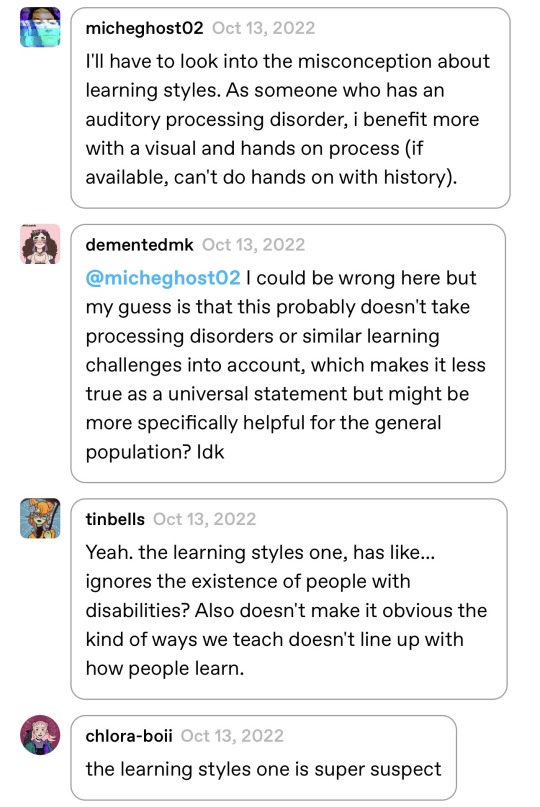
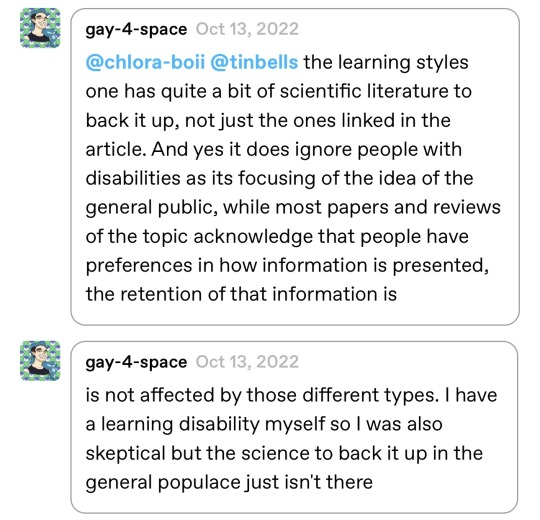
[id: 1st picture is a fact taken from Wikipedia that says, “Sharks can have cancer. The misconception that sharks do not get cancer was spread by the 1992 book Sharks Don’t Get Cancer,”
2nd picture is a 1 panel comic. It’s a drawing of a teacher looking at her laptop and saying, “Okay, middle school students, it’s the first Tuesday in February. This means that by law and custom, we must spend the morning reading through the Wikipedia article List of Common Misconceptions, so you can spend the rest of your lives being a little less wrong. The guests at every party you’ll ever attend thank us in advance.”
Pictures 3, 4, 5, 6, and 7 are more facts from the Wikipedia article: “Urine is not sterile, even in the bladder.” / “Female praying mantises rarely eat the males during reproduction, especially in their natural environment. In a study in a laboratory at the University of Central Akransas, it was observed that 1 out of 45 times the female ate the male before mating, and the male ate the female with the same frequency.” / “Sugar does not cause hyperactivity in children. Double-blind trials have shown no difference in behavior between children given sugar-full or sugar-free diets, even in studies specifically looking at children with attention deficit hyperactivity disorder or those considered sensitive to sugar. A 2019 meta-analysis found no positive effect of sugar consumption on mood but did find an association with lower alertness and increased fatigue within an hour of consumption, known as a sugar crash.” / “All humans learn in fundamentally similar ways. In particular, there is no evidence that people have different learning styles, or that catering teaching styles to purported learning styles improves retention.” / ““420” did not originate from the Los Angeles police or penal code for marijuana use. California Penal Code section 420 prohibits the obstruction of access to public land. The use of “420” started in 1971 at San Rafael High School, where it indicated the time, 4:20 pm, when a group of students would go to smoke.”
Picture 8 is another fact: “Infants can and do feel pain.”
Picture 9 is a fact and picture 10 is a reaction: “People do not swallow large amounts of spiders during sleep. A sleeping person makes noises that warn spiders of danger.” And the next image is of a person pointing in confusion.
Pictures 11 and 12 are comments regarding the “learning styles” fact:
11:
micheghost02: I’ll have to look into the misconception about learning styles. As someone who has an auditory processing disorder, i benefit from more with a visual and hands on process (if available, can’t do hands on with history).
dementedmk, @micheghost02: I could be wrong here, but my guess is that this probably doesn’t take processing disorders or similar learning challenges into account, which makes it less true as a universal statement but might be more specifically helpful for the general population? Idk
tinbells: Yea. the learning styles one, has like… ignores the existence of people with disabilities? Also doesn’t make is obvious the kind of ways we teach doesn’t line up with how people learn.
chlora-boii: the learning styles one is super suspect
12:
gay-4-space, @chlora-boii @tinbells: the learning styles one has quite a bit of scientific literature to back it up, not just the ones linked in the article. And yes, it does ignore people with disabilities as its focusing of the idea of the general public, while most papers and reviews of the topic acknowledge that people have preferences in how information is presented, the retention of that information is
gay-4-space: is not affected by those different types. I have a learning disability myself so I was also skeptical but the science to back it up in the general populace just isn’t there /id]

wikipedia is a gem
179K notes
·
View notes